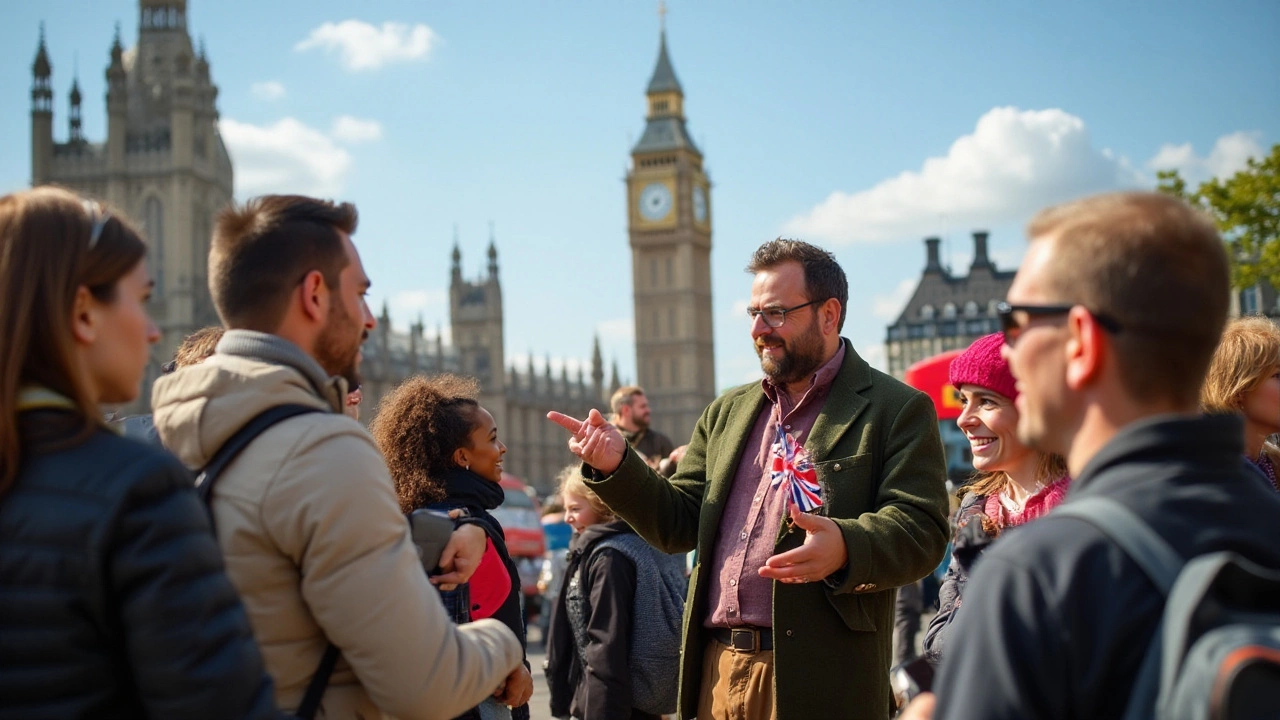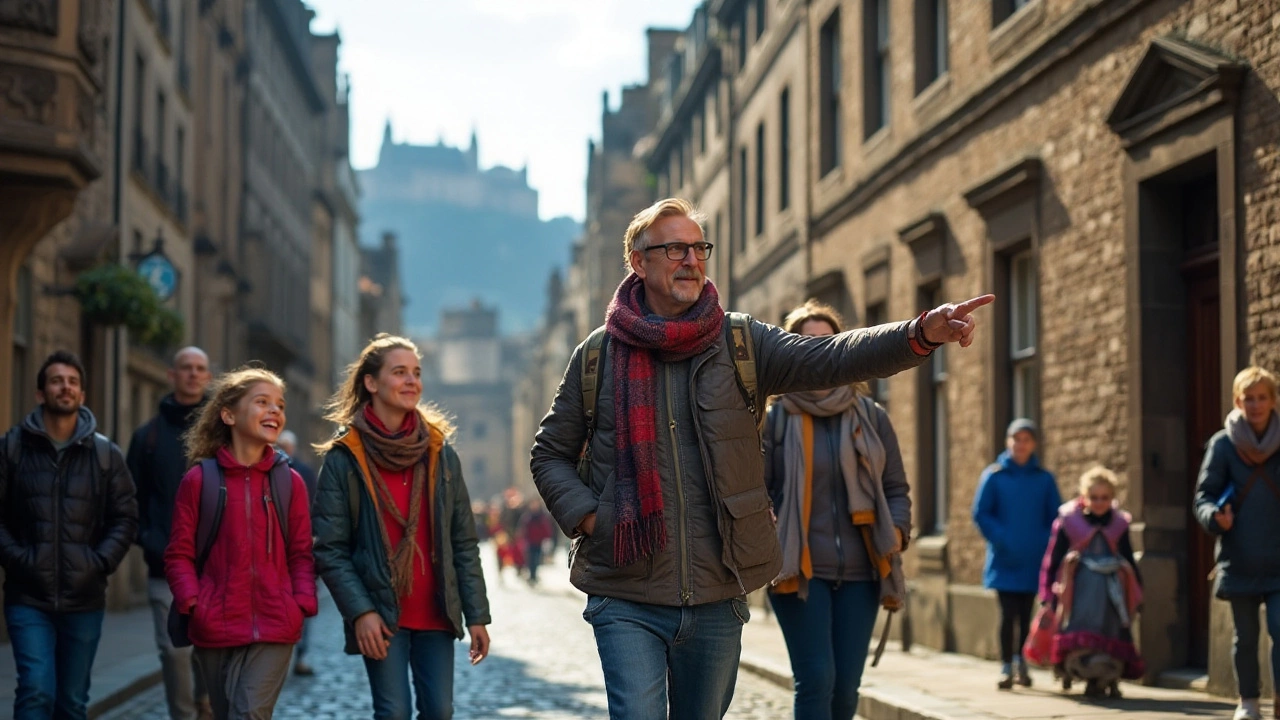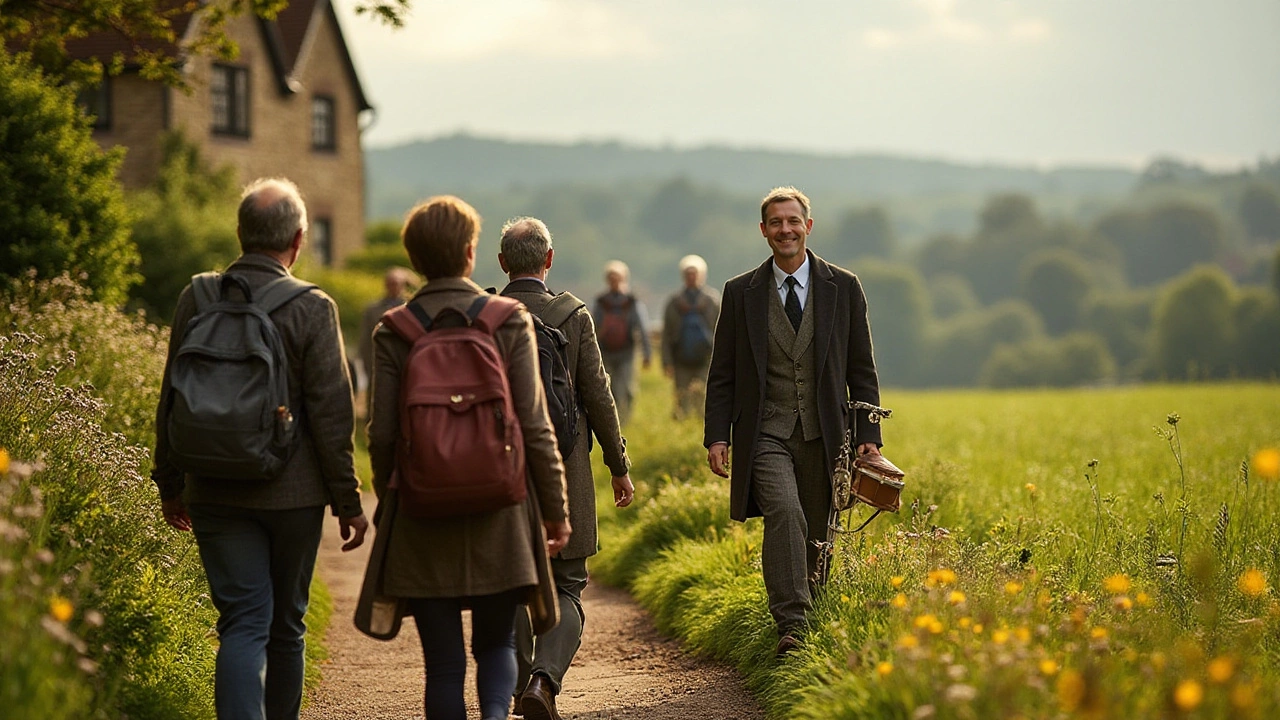Understanding the World of Guided Tours: A Traveler's Insight
 Oct, 24 2024
Oct, 24 2024
Stepping into the realm of guided tours can open up worlds of knowledge and memorable experiences. They're not just about traveling from one site to another, but about the stories that bring these places to life.
Guided tours are structured experiences where travelers are led by knowledgeable guides through famous sights and hidden gems. These guides are often well-versed in local lore and history, offering a deeper understanding of each location’s significance.
Whether you're wandering through ancient ruins or exploring bustling cities, a guided tour can provide valuable context and insights, making your travel not only informative but also more enjoyable.
- The Basics of Guided Tours
- Why Choose a Guided Tour?
- Different Types of Guided Tours
- How to Pick the Right Tour for You
- Tips for a Great Guided Tour Experience
The Basics of Guided Tours
Guided tours form the backbone of many travel experiences around the world by offering structured exploration in unfamiliar territories. At their essence, guided tours are organized journeys during which a guide, often with deep local knowledge, leads a group through notable attractions or areas of interest. These guides can range from professional historians to locals who have first-hand knowledge of their area. Guided tours can take many forms, whether it's a walking expedition across an ancient city or a bus ride across a scenic countryside. The structure of a guided tour involves predefined itineraries, ensuring that participants gain a comprehensive overview of the place they are visiting.
"A good tour guide makes sure that the group gets more than just information, they get an experience." - Rick Steves
One significant aspect of a guided tour is the expertise it provides. A well-versed guide can transform a mere visit into a rich experience by sharing insights that one might easily overlook when traveling alone. This can include details about local culture, history, cuisine, and even language quirks. Such insights offer a deeper understanding of the place and people, creating more meaningful connections. Participants have the chance to ask questions and engage actively, which often leads to a more immersive journey. Additionally, opting for a guided tour eliminates much of the typical traveler’s stress, such as navigation issues or language barriers, by providing reliable direction and assisting in logistics.
An engaging element of guided tours is their adaptability to suit different preferences and interests. There are specialized tours focusing on history, food, nature, art, and much more. For instance, culinary tours allow visitors to experience a destination's gastronomy by trying local dishes and visiting food markets. On the other hand, adventure tours could include activities like hiking or kayaking. Modern technology has also influenced this sector; audio guides, virtual tours, and interactive apps often accompany traditional tours to enhance the overall experience.
Guided tours are not only about leisure but can also play a significant role in sustainable tourism. This is primarily because they are managed and designed to control the impact on the environment and community. Many tours now prioritize eco-friendly practices, support local businesses, and emphasize cultural respect. When done responsibly, these tours can support conservation efforts, provide educational experiences, and assist in the economic well-being of local communities.
An interesting fact is that the global market for guided tours has been expanding substantially. The demand for guided experiences is expected to grow steadily due to increasing travel trends and a growing interest in personalized experiences. Statistics show that over 60% of travelers prefer guided tours when visiting unfamiliar destinations for the first time, revealing a strong reliance on expert-led travel.
To summarize, guided tours blend convenience, education, and enjoyment into one package. They cover a broad spectrum of interests, ensuring travelers from all walks of life can find an experience tailored to their desires. Stepping into a guided tour often means embarking on an educational adventure led by passionate individuals with a wealth of stories and insights, providing more than just a visit but a journey through time and culture.
Why Choose a Guided Tour?
Exploring new destinations can be as daunting as it is exciting, especially if you're navigating a place rich in culture and history. That's where guided tours come in as a valuable ally in your travel adventures. With a guide, you don’t just see the sights; you understand them in context, gaining insights into their historical relevance or cultural significance. This deeper dive into unfamiliar territories enriches your travel in countless ways. Many travelers often express a greater appreciation and a more profound connection to places explored with a seasoned guide at their side.
Choosing a guided tour can transform your travel experience by removing many of the common anxieties that often accompany exploring alone. Language barriers, getting off the beaten track, or simply the lack of local knowledge can make traveling challenging. A knowledgeable tour guide can ease these worries, providing you with a sense of security as you explore. They know the ins and outs of the location, which means less stress over navigation and more time to absorb your surroundings. You're in experienced hands, ensuring you won't miss out on any hidden gems, local customs, or must-see attractions.
Guided tours are not just about ticking destinations off a list; they also offer a chance to meet and share experiences with fellow travelers who share your interests. It’s a great way to make friendships and connections that might last a lifetime. There are social and educational benefits to having a guide who can make history come alive with stories and anecdotes that you might not find in a travel book. For instance, a guide in Paris might recount lesser-known tales of the artists who flocked to Montmartre, or how Venice’s intriguing alleyways have inspired countless romance stories.
"Travel not to escape life, but so life doesn’t escape you. Guided tours can offer the insight and company that enrich our journeys," says travel expert Rick Steves.Moreover, participating in a guided tour reduces the planning burden on your shoulders. Tour operators usually handle all logistics—from permits to transportation—so you can focus on enjoying your travel. With everything pre-arranged, your only responsibility is to show up. This convenience can be invaluable, especially if your visit involves complex itineraries or destinations that are hard to reach.
Economically speaking, guided tours often present a cost-effective way to travel. Compared to visiting a destination solo, tours can offer group discounts, whether on entrance fees or meals, leading to overall savings. Considering the additional benefits of knowledge and experience a guide brings, the cost is often offset by the value you gain from such experiences. All in all, if you're aiming for a hassle-free journey where you gain a deeper connection with the places you visit, guided tours are a fantastic option to consider.

Different Types of Guided Tours
When we talk about guided tours, we essentially delve into a world of diverse experiences that cater to the varying tastes and interests of travelers. A guided tour is not just a one-size-fits-all adventure; it is an opportunity to engage in tailor-made experiences that align with one’s specific interests. For instance, traditional walking tours are among the most common types, where groups are led through streets and landmarks, allowing them to soak in the cultural and historical essence of a place on foot. These tours provide an intimate view of the destination, often revealing little-known stories and nuances that might be missed when traveling without a guide.
Alongside walking tours, there's a surge in popularity of themed tours, which focus on specific interests or niche topics. Food tours, for example, allow one to savor a region’s culinary heritage, often including stops at local markets, diner tours, or even cooking classes led by local chefs. Other themed tours might center around photography, offering the perfect opportunity to capture iconic sights and hone skills under the guidance of a professional photographer. Then there's eco-tours, focused on imparting knowledge about local ecosystems, often including activities like hiking through wildlife preserves or diving excursions.
Another intriguing option within the world of travel experiences is the advent of virtual guided tours. With technology making the world more connected, virtual tours allow us to explore distant lands from the comfort of our homes. These tours can range from live-streamed walks through bustling city streets to guided explorations of remote archaeological sites. Virtual tours democratize travel, making it accessible to those who may be unable to travel physically due to financial or physical limitations. In recent years, travel agencies have also begun to offer hybrid tours, which blend the virtual element with the physical by facilitating pre-tour sessions online to prepare travelers for what lies ahead.
"A guided tour, whether physical or virtual, is not just about visiting a location; it’s about immersing oneself in the local culture and history," says travel expert, Samantha Brown.
We must not overlook specialized tours, which are designed for specific audiences. For instance, adventure tours cater to thrill-seekers, offering activities like mountain climbing, river rafting, or safaris—all led by skilled guides who ensure both safety and an adrenaline-fueled experience. On the other hand, cultural tours delve into a region’s traditions, often including visits to historical sites, museums, and participation in local festivals, providing travelers with an immersive dive into the cultural tapestry of the area. Finally, luxury tours offer a different kind of indulgence, focusing on comfort, exclusivity, and personalized service, often featuring stays in opulent accommodations and private access to exclusive sites or events.
If you ever find yourself overwhelmed by the myriad options, it might be worthwhile to weigh your interests and do a bit of research to identify the type that suits you best. Whether it’s delving deep into the local cuisine on a food tour, escalating your pulse with a thrill-inducing adventure, or savoring the opulence of a luxury escapade, there is a guided tour crafted for every traveler’s soul. Each type promises a unique lens through which to view and appreciate the world, adding depth to your travel narratives and leaving you with cherished memories.
How to Pick the Right Tour for You
Embarking on the perfect guided tour begins with identifying what you wish to gain from the experience. Are you drawn to historical narratives, or do you seek culinary adventures? Perhaps you crave the thrill of nature expeditions. Understanding your passions will help you narrow down your options significantly. It's also crucial to consider your pace. Some tours move at a brisk pace, ideal for those eager to squeeze the most into their day, while others allow for leisurely exploration. Knowing your preferred tempo can make the difference between a delightful journey and a tiring marathon.
Another aspect to think about is the group size you're comfortable with. Smaller tours tend to provide a more intimate experience, allowing you to ask questions and engage directly with the guide, whereas larger groups might be more cost-effective and are perfect for social butterflies. Budget considerations can't be overlooked either. Have a rough idea of how much you're willing to spend on a tour. This will help you filter out options that exceed your budget and focus on those that offer the best value for your money. It's also smart to research what the tour package includes. Sometimes added perks like meals, transportation, or entrance fees justify a higher price.
Testimonials and reviews play a significant role in evaluating the quality of a tour. Sites like TripAdvisor or Lonely Planet host numerous opinions from previous travelers. Reading these can provide insights into the tour's actual execution versus what is promised. It's not just about looking at the average score; dig deeper into the comments for more personal anecdotes. The expertise and personality of the tour guide can make or break the experience. Guides who are passionate about their subject and have engaging storytelling skills are more likely to keep your interest piqued throughout.
"A great tour guide becomes the bridge between you and the culture, turning what could be mundane into a vivid, memorable narrative," notes travel enthusiast Rick Steves.
Consider also the time of year you plan to take your tour. Some destinations have peak seasons filled with bustling crowds, while others offer serene landscapes at off-peak times. Weather, too, can play a big part in planning. Understand the climate conditions of your chosen location and pick a tour that aligns with the type of weather you enjoy most.
Finally, don't hesitate to reach out and ask questions before you book. Many tour operators are happy to provide more details and help you feel confident in your choice. Talking to a representative can sometimes reveal additional options or even discounts. Once you've gathered all the necessary information, trust your instincts; the right tour should blend seamlessly with your interests and needs, promising not just a journey, but an adventure you'll cherish.

Tips for a Great Guided Tour Experience
Embarking on a guided tour is a fantastic way to delve deep into unfamiliar places with the added comfort of having an expert by your side. To truly soak in everything these tours have to offer, there are a few strategies that can elevate your experience from good to truly outstanding. One key aspect is preparation. Before you even set foot on this adventure, researching the destination and the points of interest along the way can give you a head start. Having background knowledge allows you to engage more deeply with the information provided by your guide. As you prepare, make sure to note any special cultural customs or social norms—these tiny insights can make a world of difference in how you perceive and react to your surroundings during the tour.
Once you’re on the tour, it’s vital to stay engaged and curious. The guide is an invaluable resource, often filled with vibrant stories and tidbits of history. Asking questions not only clarifies your understanding but also shows your interest, encouraging the guide to share even more. It's a special exchange that can enrich the experience for both you and the guide. Moreover, stay observant of your environment. Sometimes, the magic is in the unexpected—a local shopkeeper's gesture, a stray alleyway, or even the scent of foreign spices lingering in the air. These are the elements that often go unnoticed in a fast-paced tour, yet they contribute immensely to the mosaic of your travel experience.
Timing can significantly impact your tour experience as well. Joining a morning tour might mean fewer crowds, which enables a more intimate interaction with the site and the guide. This can also offer better photo opportunities, devoid of the hustle and bustle that typically accompanies later visits. On the contrary, an evening tour might provide a completely different vibe, perhaps more relaxed, with waning sunlight casting beautiful shadows on ancient architectures. Often, making these nuanced choices can be the difference between a standard tour and a memorable one, filled with surprising discoveries.
Comfort is also a crucial element for enjoying a guided tour. Practical attire, especially comfortable walking shoes and weather-appropriate clothing, can considerably affect your day. If the day promises to be sunny, a hat and sunscreen are essentials. For those cooler locales, layers are your best friend, enabling you to adjust as necessary. And always keep water and a small snack handy—though provided at stops, having your own is a safety net, ensuring you can focus on having fun instead of worrying about your next source of hydration or bite to eat.
No journey carries one far unless, as it extends into the world around us, it goes an equal distance into the world within. - Lillian Smith
Finally, respect for your fellow travelers and your guide rounds out the essence of a great guided tour. Good manners go a long way. Whether it’s soft talking during explanations, punctuality, or simply lending a hand to a fellow traveler, a positive attitude creates a shared sense of camaraderie. It is this shared joy and discovery that turn simple tours into shared stories and lasting friendships along the way.
